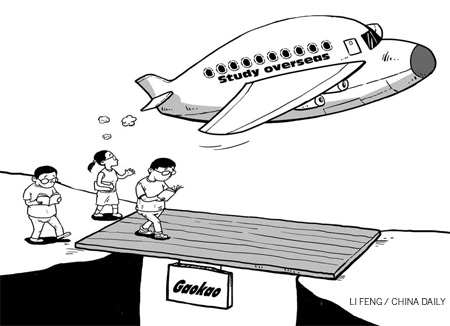High school students across China are taking gaokao, the annual national college entranceexamination, which normally lasts three days. This time every year, students and their parents faceintense pressure, while teachers, neighbors - in fact, the entire nation - lend them support. Theintense competition has a critical outcome.
This year the number of students taking gaokao is about 9.33 million. It was 9.46 million last yearand 10.2 million in 2009. The reasons for the decline are the decreasing birth rate and the risingpopularity of overseas undergraduate studies.
The decreasing birth rate is a cold demographic fact, given China's strict family planning policy.Overseas studies, however, is a hotly debated phenomenon. In 2010, about 200,000 high schoolgraduates skipped gaokao in favor of studying overseas. The meaning of this youthful migration isnot yet clear.
There exists a debate among experts, families and schools on whether high school graduatesshould study overseas. The answer of many experts is a clear "no". Studying overseas is deemedrisky for youngsters' normal development, and may not contribute significantly to their future careersuccess. Also, it will most certainly put an inordinate financial burden on them and their families.
Sending youngsters to study overseas is not new in China. Between 1872 and 1875 the QingDynasty (1644-1911) rulers created the Chinese educational mission (CEM), which sent 120carefully selected boys, some as young as 14, to study in the United States. With newfound Westernknowledge, they returned to serve China. They became diplomats, business leaders, navycommanders who fought in the Sino-French War (1883-1885), engineers like Zhan Tianyou whobuilt China's first railway without foreign help, and diplomats such as Tang Guoan who founded theworld-famous Tsinghua University, which is celebrating its 100th anniversary this year.
The CEM experiment was successful for the following reasons. CEM's mission was clear andexecution focused. Student quality was uniformly high. It was well funded by the Qing government. Itwas supported by the US government and by institutions such as Yale University, too. Students werechaperoned and lived with caring American host families. Last but not least, students' culturalexposure was balanced, for during their stay in the US, they also received traditional Confucianinstructions from CEM tutors.
Even after 140 years, there is a lesson to be learned from the CEM experience. Overseas education for Chinese students, especially for high school students, can be beneficial only if properarrangements are made. Studying abroad for high school graduates is a risky proposition today.For many students and their parents, the arrangements could be too ill-conceived, inadequate orinflexible to accommodate circumstantial changes. Other students may fare better, because ofproper planning and arrangements made to counter academic, emotional, social, financial andcultural inadequacies they could face. Ultimately, parents are primarily responsible for makingproper arrangements for their children.
Today, many of those who skipped gaokao are top students, while others are not. The top studentsmay receive multiple undergraduate acceptance letters from top foreign universities. And averagestudents may be lured to attend lower-tier institutions that are eager to accept foreign students butnot capable to accommodate their special academic and personal needs.
Many 18-year-olds are not mature enough to take proper care of themselves. In April, a Chineseyouth from a rich family was kidnapped and robbed of his Porsche after attending a university inBoston for only a few months. This happened largely because he was flashing a lot of cash andpaying big bar tabs for friends around campus. Luckily, he was later rescued by police.
Then there are students with financial worries. In the same month, a student returning from acollege in Japan stabbed his mother at Shanghai airport after he got into an argument with her overtuition.
Money can be a burden. If having too much money but not knowing how to spend is a burden, nothaving enough and not knowing how to make the requisite adjustments is also a burden.
To take the gaokao, attend a university in China, work a few years, and then go overseas foradvance study would be a sounder approach for a more mature individual. The properarrangements, still required, would be less complicated than the case for undergraduate overseasstudies.
To take gaokao or opt to study abroad either can be a good choice. The question is "when" and for"whom". To answer this one needs self-knowledge. As an expert has summed up the requisite self-knowledge, "yin ren er yi, liang li er xing", which roughly translates into: "Use different measures to fitdifferent needs. Do what is only within one's ability to do."
The author teaches Western and Chinese philosophy at Montclair State University, Upper Montclair,New Jersey, US.
Source: The China Daily


No comments:
Post a Comment